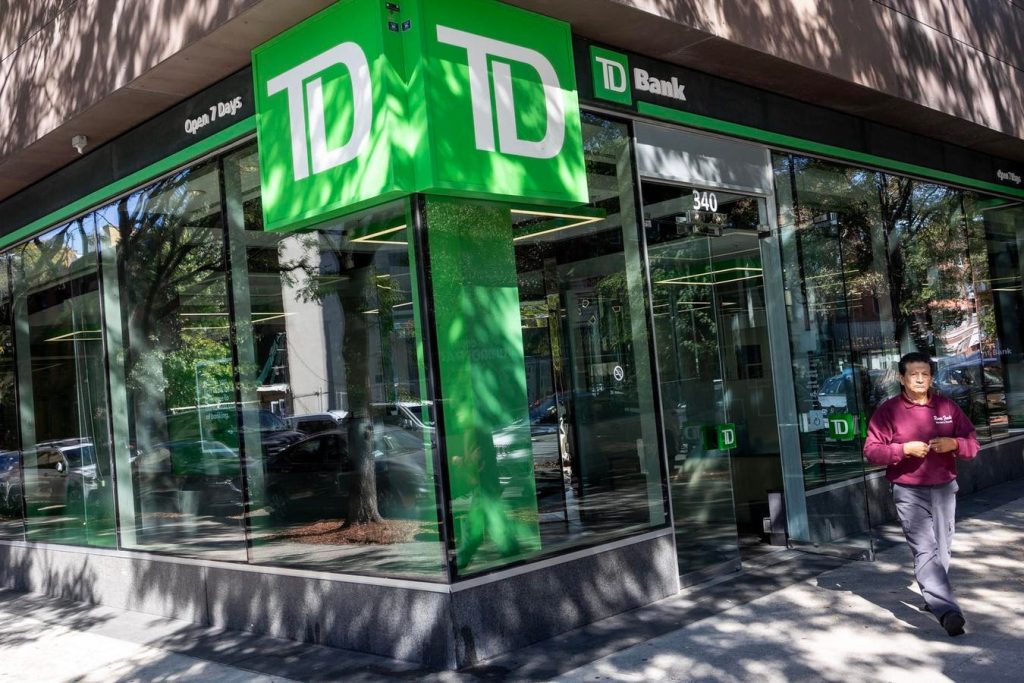NEW YORK, NEW YORK – OCTOBER 11: A branch of the Canadian based TD bank, on the morning they plead … [+]
In October TD Bank pled guilty to both civil and criminal charges including conspiring to violate the Bank Secrecy Act related to money laundering. As a condition of the settlement, TD Bank will pay a $1.8 billion criminal penalty which when added to the civil fines brings the total to $3 billion dollars that the bank will pay to settle these charges.
The terms of the settlement require TD Bank to cooperate in full with the continuing investigation of the Justice Department into the activities of TD Bank’s officers, directors and employees in regard to the money laundering violations that occurred at the bank between January 2014 to October 2023 during which time TD Bank failed to monitor $18.3 trillion dollars of questionable customer activity. Whether indeed this further investigation will result in high bank executives being charged is very much an open question.
In September, the bank’s President and CEO Bharat Masrani announced he will be retiring in April of 2025. No charges have been brought at this time against Masrani and if history is followed, none will be filed. The sword of Damocles hanging over the bank should it fail to cooperate fully with the Justice Department’s further investigations of its officers, directors and employees is the threat of additional criminal charges that could be brought against the bank with the facts as admitted to in the Consent Decree able to be used as evidence against the bank.
On December 9th Senate Finance Committee Chair Ron Wyden, D-Ore and Senator Elizabeth Warren, D- Mass sent a letter to Masrani asking for detailed information in regard to involvement of the bank’s employees in money laundering of $474 million in cash from fentanyl sales in the United States by Chinese criminal syndicates that was noted in the recent TD Bank settlement agreement.
In the letter Senators Wyden and Warren wrote:
“According to federal court records between 2018 and 2023 TD bank employees helped a network led by Da Ying Sze (hereinafter ‘Sze network) launder approximately $474 million in cash from illicit sales of fentanyl and other narcotics through TD Bank branches in New Jersey, New York, Pennsylvania, Maine and Florida. As part of this scheme Da Ying Sze bribed TD Bank employees in order to deposit large amounts of cash –occasionally in excess of one million dollars in a single day —- into accounts not formally under his control. The Sze network also used TD Bank to issue official checks and make international and domestic wire transfers to transfer illegal cash from fentanyl sales to thousands of individuals and entities in the United States, China, Hong Kong and elsewhere.”
The letter went on to say that the” money laundering scheme was done with the knowledge and participation of TD Bank employees” and that “It appears that TD Bank compliance executives tasked with overseeing the bank’s anti-money laundering (AML) program were also notified of the SZE network’s suspicious activities, but failed to act in a timely manner. For example, an executive who was the head of TD Bank’s U.S. Financial Intelligence Unit regularly received reports throughout 2020 indicating that the extraordinary volume and value of the Sze network’s millions in bank checks were ‘substantial outliers.’ These reports flagged $8.3 million worth of checks purchased with cash by Da Ying Sze and his associated. This same head of TD Bank’s Financial Intelligence Unit apparently did not conduct additional investigation concerning the Sze network.”
Pointing to the present lack of any charges brought against higher up executives of TD Bank the letter concluded saying “Unfortunately, it is unclear what consequence, if any, TD Bank executives faced for enabling this massive fentanyl money laundering scheme. TD Bank’s conduct endangered American lives and helped dangerous criminals from China and elsewhere expand their fentanyl trafficking operations in the U.S. The fentanyl crisis in America has already resulted in 100,000 deaths since 2002, and immediate action is needed to prevent traffickers from using the U.S. banking system to launder profits from the sale of this deadly poison. This includes swift action to hold bankers accountable, including criminal prosecution and sanctions.”
On December 11th, the Justice Department charged a third minor level TD Bank employee, Leonardo Ayala, from its Doral, Florida branch with money laundering , but to date, the Justice Department has taken no action against any higher level executives despite what appears to be substantial evidence of personal involvement by such executives within the bank.
Law enforcement actions against big banks such as TD Bank have resulted in large fines such as, in 2012 when HSBC was fined $1.9 billion for laundering money for drug cartels, terrorist organizations and sanctioned countries such as Iran and North Korea. However, no individual banker was charged at HSBC. Whether the Justice Department’s continuing investigation of officers, directors and employees of TD Bank will result in executives in positions of power rather than just the banks themselves or lower level employees being criminally charged for these crimes remains to be seen.
